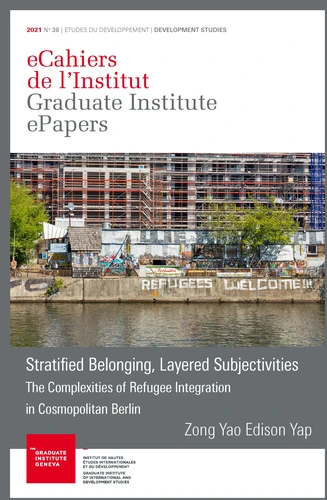Stratified Belonging, Layered Subjectivities. The Complexities of Refugee Integration in Cosmopolitan Berlin
Par :Formats :
Disponible dans votre compte client Decitre ou Furet du Nord dès validation de votre commande. Le format Multi-format est :
- Pour les liseuses autres que Vivlio, vous devez utiliser le logiciel Adobe Digital Edition. Non compatible avec la lecture sur les liseuses Kindle, Remarkable et Sony
 , qui est-ce ?
, qui est-ce ?Notre partenaire de plateforme de lecture numérique où vous retrouverez l'ensemble de vos ebooks gratuitement
Pour en savoir plus sur nos ebooks, consultez notre aide en ligne ici
- Nombre de pages38
- FormatMulti-format
- ISBN978-2-940600-27-4
- EAN9782940600274
- Date de parution08/04/2021
- Protection num.NC
- Infos supplémentairesMulti-format incluant PDF avec W...
- ÉditeurGraduate Institute Publications
Résumé
Recent studies show that immigration remains a top concern for Germans, with 46% expressing doubts that refugees can successfully integrate into German society. But what determines the successful integration of refugees? And what shapes their willingness to integrate into German society? Through qualitative interviews with both refugees and migrants, I investigate the relationship between their experience with discrimination and integration in Berlin.
Importantly, I demonstrate how one's appearance, ethnicity, religion, and so forth, can influence one's experience with discrimination and integration trajectory; and through the multiple subjectivities I uncover, I show how complex the project of integration actually is. Additionally, by juxtaposing the experiences of post-2015 refugees with those of earlier Turkish and Arab immigrants, I highlight how the poor integration of earlier immigrants can adversely affect the integration of subsequent immigrants.
Taken together, these insights challenge the image of Berlin as a cosmopolitan city. We extend our heartfelt thanks to the Vahabzadeh Foundation for financially supporting the publication of best works by young researchers of the Graduate Institute, giving a priority to those who have been awarded academic prizes for their master's dissertations.
Importantly, I demonstrate how one's appearance, ethnicity, religion, and so forth, can influence one's experience with discrimination and integration trajectory; and through the multiple subjectivities I uncover, I show how complex the project of integration actually is. Additionally, by juxtaposing the experiences of post-2015 refugees with those of earlier Turkish and Arab immigrants, I highlight how the poor integration of earlier immigrants can adversely affect the integration of subsequent immigrants.
Taken together, these insights challenge the image of Berlin as a cosmopolitan city. We extend our heartfelt thanks to the Vahabzadeh Foundation for financially supporting the publication of best works by young researchers of the Graduate Institute, giving a priority to those who have been awarded academic prizes for their master's dissertations.
Recent studies show that immigration remains a top concern for Germans, with 46% expressing doubts that refugees can successfully integrate into German society. But what determines the successful integration of refugees? And what shapes their willingness to integrate into German society? Through qualitative interviews with both refugees and migrants, I investigate the relationship between their experience with discrimination and integration in Berlin.
Importantly, I demonstrate how one's appearance, ethnicity, religion, and so forth, can influence one's experience with discrimination and integration trajectory; and through the multiple subjectivities I uncover, I show how complex the project of integration actually is. Additionally, by juxtaposing the experiences of post-2015 refugees with those of earlier Turkish and Arab immigrants, I highlight how the poor integration of earlier immigrants can adversely affect the integration of subsequent immigrants.
Taken together, these insights challenge the image of Berlin as a cosmopolitan city. We extend our heartfelt thanks to the Vahabzadeh Foundation for financially supporting the publication of best works by young researchers of the Graduate Institute, giving a priority to those who have been awarded academic prizes for their master's dissertations.
Importantly, I demonstrate how one's appearance, ethnicity, religion, and so forth, can influence one's experience with discrimination and integration trajectory; and through the multiple subjectivities I uncover, I show how complex the project of integration actually is. Additionally, by juxtaposing the experiences of post-2015 refugees with those of earlier Turkish and Arab immigrants, I highlight how the poor integration of earlier immigrants can adversely affect the integration of subsequent immigrants.
Taken together, these insights challenge the image of Berlin as a cosmopolitan city. We extend our heartfelt thanks to the Vahabzadeh Foundation for financially supporting the publication of best works by young researchers of the Graduate Institute, giving a priority to those who have been awarded academic prizes for their master's dissertations.



